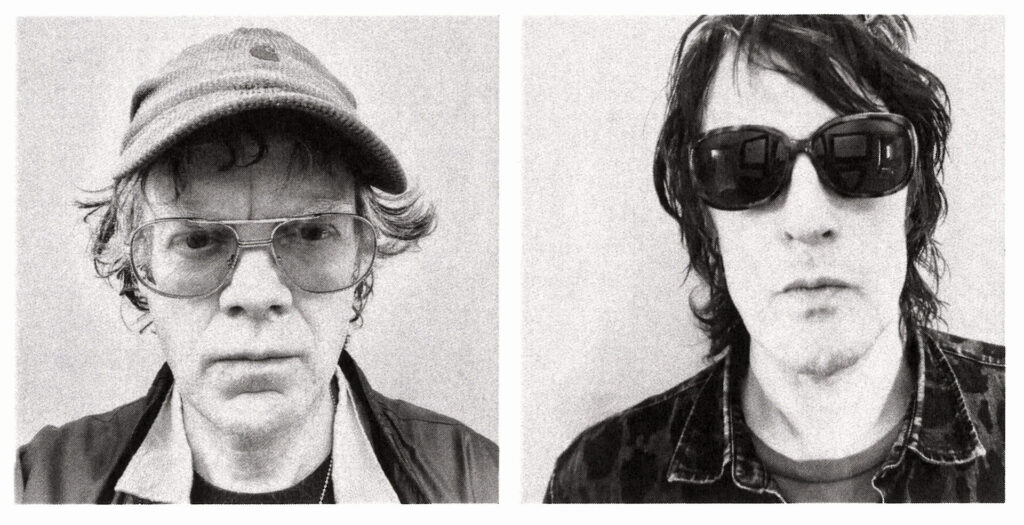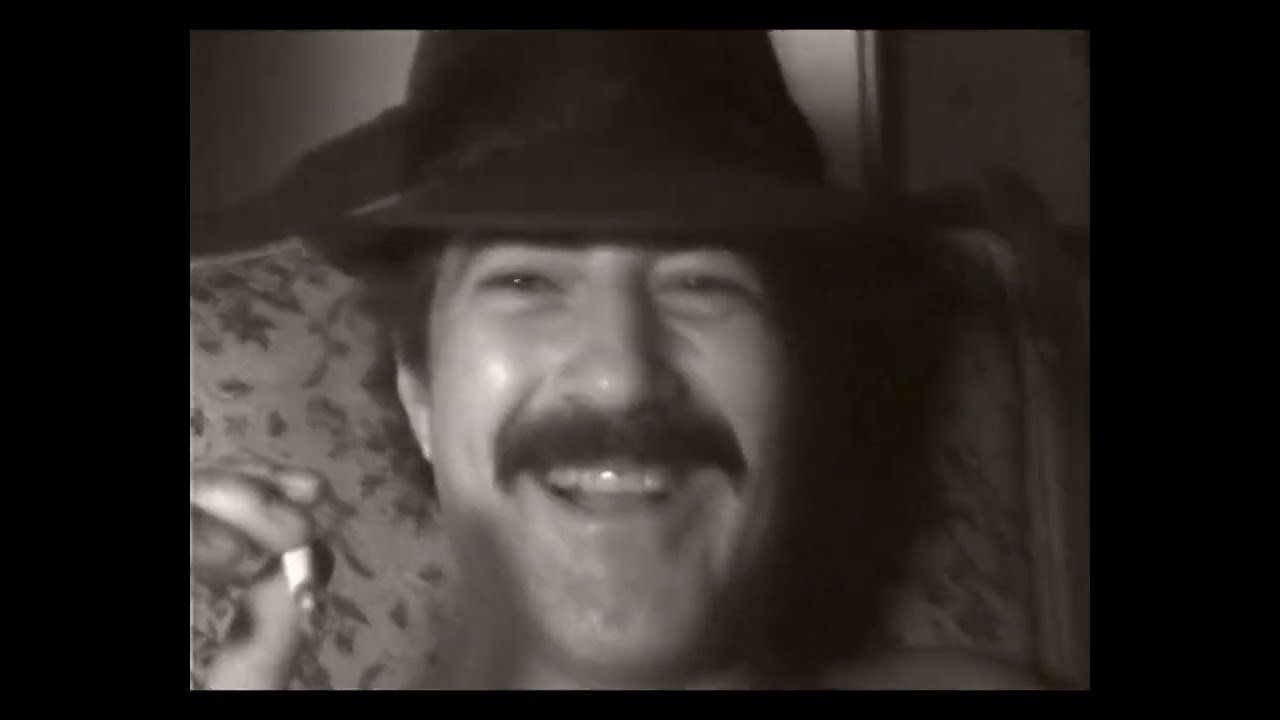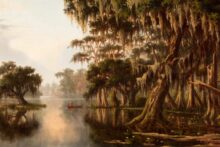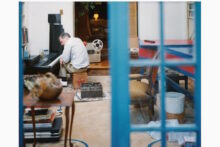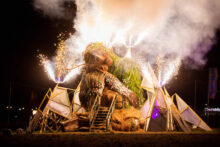Head south in the US, the cliche goes, and things start turning biblical. Keep going into the Deep South and things turn surreal. There’s God-fearing country but beyond that, there’s a place where even God starts to warp. Chicago may have been where American music was electrified (with the Great Northward Migration of around six million Black Americans), Detroit where it was perfected on the production line, it may have developed under California sun and New York neon, but the real crucible of popular music in the States was the Deep South. Congo Square, Sun Records, the Grand Old Opry, Stax. Jazz, rock n’ roll, country, soul.
It’s all easily categorised and institutionalised now but the confluences (gospel and blues from African American churches and juke joints, Scots-Irish folk from Appalachia, Creole Zydeco and Cajun fais do-do, Southern Gothic, etc.) made that Delta landscape far more vivid and fantastical than often acknowledged. Its cast of characters is idiosyncratic – Jelly Roll Morton, Memphis Minnie, Clifton Chenier, the Empress of the Blues Bessie Smith, Dr John, Skip James, Professor Longhair, Johnny Ace and the Beale Streeters, Howlin’ Wolf, Son House, The Big O, The Killer, Baron Samedi, whoever it was that purchased Robert Johnson’s soul or poisoned his whisky. And though its places may not be what they once were (where is?), there’s still more than a hint of the strange chemistries that cultures are born from: the Crystal Shrine Ghetto, Marie Laveau’s House of Voodoo, the ruins of Jazzland, Nickajack Cave where Johnny Cash once went to die, and Graceland, the home of the Deep South’s own Mad King Ludwig.
William Eggleston belonged to this place. A Memphis-born hard-drinker and carouser, he was one of its cast, though aristocratic (with all its shadows) by birth, and one of its finest ethnographers. He was also a revolutionary in terms of photography, changing the profession as much as his friend Henri Cartier-Bresson did with his ‘decisive moment’. At first, Eggleston’s ‘democratic forest’ seems the direct opposite of Cartier-Bresson, who captured perfectly-timed instances where street scenes and people appeared epic, at least for a fraction of a second. Eggleston’s photos seemed chaotic, inconsequential, by comparison.
They were in colour, a medium disdained by ‘serious’ photographers, erasing the astonishing history of autochromes, for example, or the fact that life isn’t lived in monochrome. Yet both photographers were advocates of readjusted ways of seeing the world. For Eggleston, nothing was mundane if looked at in the right – or ‘wrong’ – way. Mundanity was simply in the eye of the beholder. He showed us a world we were hitherto ignoring, stories where none were assumed to be, exemplified by ‘The Red Ceiling’. Taken in Greenwood, Mississippi in 1973, it was made famous as the cover of Radio City by Memphis’ own Big Star. It’s just a light bulb and wires in a room somewhere and yet it’s bizarrely charged, threatening, intense, inscrutable. You’re looking at nothing and you feel it looking back.
Eggleston presented the invisibly-familiar from angles that revealed the ordinary to be just an illusion of complacency. He wasn’t the first to do so, by admission, pointing to Lee Friedlander and Gary Winogrand and lamenting that their trailblazing had not been pursued. It took Eggleston for it to take root, to see that the detritus and jewels of Americana were not that far apart, given so much is disregarded. “I am at war with the obvious,” Eggleston told an interviewer, and given the falsehoods and philistinism disguised as or hiding behind the obvious, it was a noble declaration.
Stranded In Canton is Eggleston’s 1974 documentary of the Deep South and its inhabitants, most of whom are his friends, co-conspirators, family or fellow debauchees. It’s full of the kind of freaks and misfits – ‘characters’ we might call them – you meet if you live certain kinds of lives. Judging from the monologues and dialogues that feature on this soundtrack, the scenarios feel seconds away from exploding or imploding (the atmosphere is “Hogarth on Beale Street,” as Richard Williams puts it). Madness, danger, divine inspiration or abjection never seem far away, in what is ostensibly a singularly eccentric and exceptional home movie, one featuring guns, geeks and Quaaludes, and a time now lost and gone. You can see why the film is so beloved by later directors like Harmony Korine and Gus Van Sant. And why J Spaceman and John Coxon of Spiritualized decided, at the invite of the artist Doug Aitken, to soundtrack the film in the Barbican in 2015, with Fat Possum now releasing the album, before a fresh series of live performances of the score. These will not be typical Spiritualized shows, it’s emphasized in the publicity. After all, we’re not in Kansas anymore.
There’s little trace of the space station Spector or oceanic sigh of Spiritualized here. ‘I was stranded in Canton’ does initially have a Spaceman 3 feel, with hints of the ‘Cosmic American Music’ Gram Parsons championed. Yet rather than drifting into big sky Lanois-esque dreaminess, it descends into the wild and claustrophobic Deep South night, the music weaving a thread through a bedlam of voices. Rather than psychedelia as the title might imply, ‘Last week I took a trip’ is a gripping discomforting bayou blues, while the strung-out ‘It’s not gospel’ meanders through a heated if somewhat theatrical row.
The more serene moments are as country-inflected as they are indebted to the Velvet Underground. ‘What train blues’, ‘Back up William’ and ‘Everybody in their life at one time or another’ have a louche, unravelled quality, akin to the Stones’ version of Robert Johnson’s ‘Love In Vain’. You get a sense of transatlantic distance as well as resonance throughout. It’s Americana not as authenticity or kitsch but as an alien broadcast across the planet, that strikes at something deep in the soul in a faraway listener but re-emerges in splendid, mutated form of response. ‘I don’t know what I can possibly do’, for example, threatens to take off into speedfreak rockabilly but instead adopts a slower JAMC-like groove, while ‘Love for the asking’ is less a wall of sound and more a swamp of feedback.
Though there are many climaxes throughout the album, only the clear clean sound of ‘Credits roll’ offers release. Whatever music has been sent out into the world from this raucously nonconformist south-eastern corner of the US, the echo that returns is transformed in the process, which is the story of modern music in microcosm. The inhabitants may be stranded but their howls, rants and laughter carry much further than they ever could have imagined.
Part improvisation, part composition, Music for William Eggleston’s Stranded in Canton is very much a journey, though a spiralling one with recurring motifs: cyclical arguments and righteous declamations, snatches of barroom piano or blasted harmonica from the film amidst layers of noise, held together by the duo’s trance-paced guitar arpeggios, feedback drones and rattlesnake sonics. The music is the sleep to this flip side of the American dream. Is it entirely pleasant? Not entirely but show me a nightmare that isn’t absolutely compelling.

